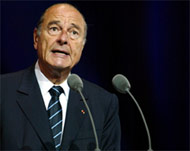Call for panel on biodiversity loss
A five-day conference on biodiversity has wrapped in Paris with an expected call to set up a top scientific panel focussing on species loss.

Sources at the UN-backed forum said on Friday the aim was to set up the equivalent to a paramount scientific authority on climate change, whose findings have powerfully influenced the debate on global warming.
Leading experts on biology and conservation would sift through the best knowledge about biodiversity to compile reports for policymakers and the public.
“Biodiversity is being destroyed irreversibly by human activities,” said a petition launched on Monday by some of the top names in the field to float the idea.
They said the millions of different species on Earth are the
product of more than three billion years of evolution, “a natural heritage and a vital resource upon which humankind depends in so many different ways.”
Under threat
Almost everywhere, animals and plants are under threat from loss or degradation of habitat, from pollution of the soil, water and the air, from the exhaustion of soils, water tables and rivers by over-exploitation, “and, more recently, signs of long-term climate damage.”
 |
|
Jacques Chirac has backed up |
The proposal has been backed by French President Jacques Chirac, who says he will lobby for it at the UN Convention on Biological Diversity (CBD), an offshoot of the landmark 1992 Earth Summit in Rio de Janeiro.
Around 1200 people attended the conference, whose themes ranged from nuts-and-bolts work of identifying the world’s millions of species to habitat degradation and factoring in environmental costs in the price of goods and services.
A foremost US scientist, Edward Wilson, said it would cost about $3 billion to draw up an inventory of the world’s species, and take 25 years to complete it.
Saving the 25 most-threatened “hotspots” that abound in species, such as the Amazonian forest, would cost $25 billion, he said.
Some scientists believe that human interference is driving the
world towards its biggest mass extinction in 65 million years, when the dinosaurs were wiped out by climate change inflicted by an asteroid impact.